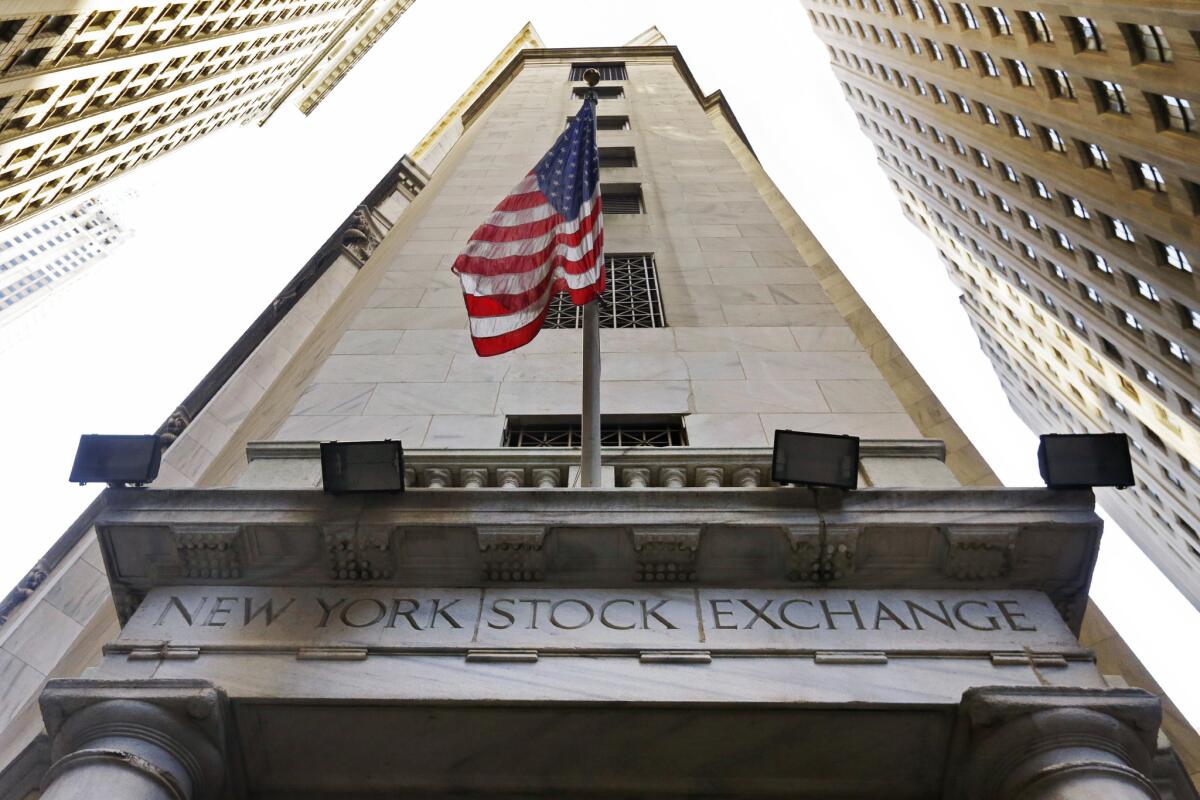China stimulus propels U.S. stocks’ biggest gain since March

- Share via
U.S. stocks surged to their biggest gain in two months Tuesday after the Chinese government moved to stimulate the world’s second-largest economy. That gave a big boost to energy, chemicals and machinery companies.
Investors have worried for months about the state of China’s economy, which is slowing down after a quarter century of rapid growth. The prospect of greater sales to China lifted companies that make basic building materials, chemicals, building and mining equipment, and aircraft. The price of oil matched a six-month high. Companies that drill for oil and refine it also rose. All 10 industrial sectors of the Standard & Poor’s 500 index finished higher.
Investors have been taking money out of stocks lately, said Bob Doll, chief equity strategist and senior portfolio manager at Nuveen Asset Management. He said they were glad to see China’s government do something about its economy.
“It’s just another small step on the way of China attempting to address the issue,” he said. “This is a ray of sunshine, which is needed.”
The Dow Jones industrial average jumped 222.44 points, or 1.3%, to 17,928.35. The Standard & Poor’s 500 rose 25.70 points, or 1.3%, to 2,048.39. The Nasdaq composite index rose 59.67 points, or 1.3%, to 4,809.88.
Stocks overseas traded mostly higher after China’s Cabinet approved measures to boost exports as Beijing struggles to reduce gluts in many industries and reverse an export decline that threatens to cause job losses. The moves include more bank lending, greater tax rebates, and support for export credits.
General Electric rose 2% to $30.48, and aerospace giant Boeing rose 2%, to $134.72. Companies that make chemicals and other basic materials also rose. Dow Chemical advanced 1.4%, to $51.54, and Martin Marietta Materials climbed 3.1% to $187.85.
U.S. crude rose $1.22, or 2.8%, to $44.66 a barrel in New York. Brent crude, the benchmark for international oil prices, jumped $1.89, or 4.3%, to $45.52 a barrel in London. That canceled out Monday’s decline in oil prices, and U.S. crude matched its highest price in six months.
Among energy companies, Exxon Mobil rose 1.6% to $89.99, and Hess climbed 5.9% to $57.71.
U.S. economic news was mixed. The Labor Department said job openings in March rose the largest amount in eight months, but total hiring slowed. The department said job openings grew 2.7% to about 5.8 million. However, the slower pace of hiring suggests employers were more reluctant to fill open positions as the economy grew sluggishly.
Amazon rose 3.5% to an all-time high of $703.25 after it launched a self-publishing video platform called Video Direct. The move could make money for Amazon and budding filmmakers the way YouTube has created a community of online celebrities.
International Flavors & Fragrances, which makes ingredients for the food, cosmetics and consumer products industries, climbed 5.3% to an all-time high of $126.24 after it reported strong results for the first quarter.
Allergan, the maker of Botox and other medicines, said it will buy back up to $10 billion in stock with proceeds from the sale of its generic drug business. That sale is expected to close this year. The stock jumped 5.3% to $225 and is up 12% this week.
Gap dived 11.5% to $19.30, its lowest price in four years, after the retailer reported April sales that were far weaker than expected and forecast a smaller profit than analysts had projected.
SolarCity plunged 20.8% to $17.82 after it reported a larger first-quarter loss than Wall Street expected and cut its annual projections. The solar panel installer said that bookings weren’t as strong as it expected and that regulations held back its business.
Stocks overseas mostly traded higher. Japan’s benchmark Nikkei 225 advanced 2.2% as the yen weakened, a boon for the nation’s exporters. The dollar rose to 109.30 yen from 108.48 yen. The dollar has been very strong in recent years but has lost a bit of strength compared with the yen in recent months.
South Korea’s Kospi went up 0.8% and the Shanghai Composite was little changed. Germany’s DAX and Britain’s FTSE 100 each gained 0.7% and the CAC 40 in France advanced 0.4%.
Bond yields were stable and the yield on the 10-year U.S. Treasury note stayed at 1.75%. The euro declined to $1.1370 from $1.1389.
In other energy trading, wholesale gasoline rose 4 cents, or 3%, to $1.49 a gallon. Heating oil rose 5 cents, or 4%, to $1.34 a gallon. Natural gas rose 6 cents, or 2.9%, to $2.16 per 1,000 cubic feet.
Metals prices were little changed. Gold fell $1.80 to $1,264.80 an ounce. Silver held steady at $17.09 an ounce. Copper fell 1 cent to $2.09 a pound.
UPDATES:
2:22 p.m.: This article was updated with additional information.
1:23 p.m.: This article was updated with closing prices.
This article was originally published at 6:59 a.m.
More to Read
Inside the business of entertainment
The Wide Shot brings you news, analysis and insights on everything from streaming wars to production — and what it all means for the future.
You may occasionally receive promotional content from the Los Angeles Times.










